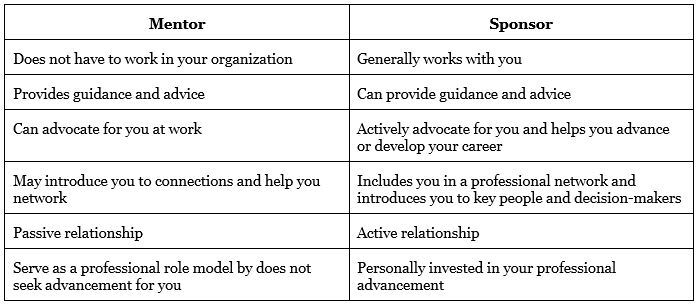Mentorship and sponsorship are always top of mind when progressing through your career. While often used interchangeably, and imperative for career growth, there is a stark difference between mentorship and sponsorship.
After attending GHJ’ recent Women’s Empowerment Speaker Series, which focused on knowing the difference and how to make the most out of both, I gained deeper insight into the distinctions between the two and how people can use both mentors and sponsors to boost their careers. The event panelists included GHJ Partner Polina Chapiro and Chief People Officer Yvonne Burke, along with USC Associate Director and Global Sector Lead Jack Ringquist and CSUN Professor of the Department of Management Dr. Lois Shelton.
My biggest takeaway from the panel was that career success should not be a lone pursuit. Research from Olivet Nazarene University suggests that in regard to professional mentorship, a majority of professionals have had a mentor at one point during their career. The report states that roughly 56 percent of the 3,000 participants surveyed indicated that they have had a mentor. This research reiterates that mentorship and/or sponsorship is a common part of one’s career trajectory. I firmly believe that a successful career is not linear (it is not a one-size-fits-all process) and takes the support of others along the way. Using both mentorship and sponsorship to your benefit can ultimately boost your career.
Basics of Mentorship
Mentorship is often looked at as helping you navigate your career. During the panel, Burke explained that she views mentors’ role as recognizing their mentees’ strengths, understanding their goals and helping them navigate their career paths.
“We do not always recognize in ourselves our own potential, which is where the mentor steps in,” Burke explained.
Often a mentor is able to identify strengths we do not readily see in ourselves and understands our career goals on a different level so they can offer recommendations we may not think of ourselves. A mentor can be a sounding board for your career goals or even assist in shedding light on possible workplace scenarios. The mentor role takes shape as they help the mentee navigate the path to success and not necessarily by promoting them in the workplace. It is a one-on-one and personal relationship and can be someone at your workplace or outside.
Defining Sponsorship
The best path to gaining a sponsor often starts with a solid mentor relationship. You cannot do one without the other. By first establishing a solid mentor relationship where ideas and goals are shared, the mentorship can transform into an active sponsorship or endorsement and subsequently assist with your career advancement.
Ringquist echoed this sentiment in stating that, “Sponsorship builds upon a strong mentor relationship.”
The key difference between mentorship and sponsorship is that a sponsor actively promotes your achievements to others. A mentor will typically be a passive relationship, whereas a sponsor will include you in professional networks, introduce you to others and is personally invested in your professional advancement. For the sponsored party, this is an active endorsement to heighten his or her profile within an organization.
It Takes Two
The FairyGodBoss accurately describes the differences between mentor vs. sponsor in the chart below.

Being Your Own Advocate
The panelists were keen on providing actionable steps in courting a mentor and then gaining a sponsorship. Knowing your goals is the foundation. The mentee should be able to voice their career goals.
If you are unable to voice your goals, my advice is to first identify your interests and where you want to go. By first identifying your interests, you will be better able to pinpoint your career goals. For example, my interests are in content creation, so part of my career goals involve learning everything about digital media and creating targeted messaging.
“Truly having goals is what propels us forward, both personally and professionally,” Chapiro elaborated.
Take the initiative to set up meetings with your mentor to discuss your goals. Shelton reinforced to “focus on what you want and where you want to go” when setting goals.
Using Sponsors and Mentors to Advance Your Career
Success is rarely reached by “going it alone.” Using your internal contacts and networks to help you establish a mentor and sponsor will ultimately help you reach your goals. The combination of both the mentor and sponsor will push you to succeed.
Think of the analogy of the door as described by Burke: a mentor will show to the door while a sponsor will help you through the door. Dedicate yourself to building and nurturing relationships with mentors and sponsors and understand that a successful career is not always a narrow path. Success may come easier with the guidance of others.

